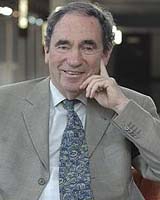
Listen
As an activist lawyer and leading member of the African National Congress, Albie Sachs lost his right arm and the sight in one eye when his car was bombed by agents of South Africa’s security forces in 1988. After recuperating in London, he returned to South Africa and played a key role in drafting its democratic constitution. Nelson Mandela appointed him a judge in the new constitutional court, where Sachs made a number of landmark rulings, including recognizing gay marriage. Sachs, a man with a remarkable ability to extract positive emotions from wounding events, shares with us South Africa’s experience in healing divided societies.
Albie Sachs’ career in human rights activism started at the age of seventeen when as a second-year law student at the University of Cape Town, he took part in the Defiance of Unjust Laws Campaign. He started practice as an advocate at the Cape Bar at age 21. The bulk of his work involved defending people charged under racist statutes and repressive security laws. Many faced the death sentence. He himself was raided by the security police, subjected to banning orders restricting his movement, and eventually placed in solitary confinement without trial for two prolonged spells of detention.
In 1966, he went into exile, first studying and teaching law in England, then working in Mozambique as a law professor and legal researcher. In 1988 his car was blown up by a bomb by South African security agents, and he lost an arm and sight in one eye. After recovering from the bomb, he devoted himself full-time to preparations for a new democratic Constitution for South Africa. In 1990 he returned home and, as a member of the Constitutional Committee and the National Executive of the African National Congress, took an active part in the negotiations, which led to South Africa becoming a constitutional democracy. After the first democratic election in 1994, he was appointed by President Nelson Mandela to serve on the newly established Constitutional Court.
Renee Montagne is co-host of NPR's Morning Edition, the most widely heard radio news program in the U.S. She has hosted the news magazine since 2004, broadcasting from NPR West in Culver City, California. She hosted All Things Considered with Robert Siegel for two years in the late 1980s, and previously worked for NPR's Science, National, and Foreign desks.
Montage has traveled the world widely, covering stories in Afghanistan and the Vatican. In 1990, she traveled to South Africa to cover Nelson Mandela's release from prison and continued to report from South Africa for three years. In 1994, she and a team of NPR reporters won a prestigious Alfred I. duPont-Columbia University Award for coverage of South Africa's historic presidential and parliamentary elections.
